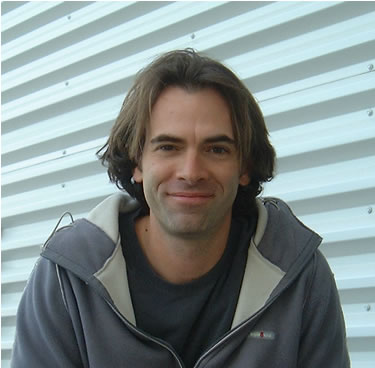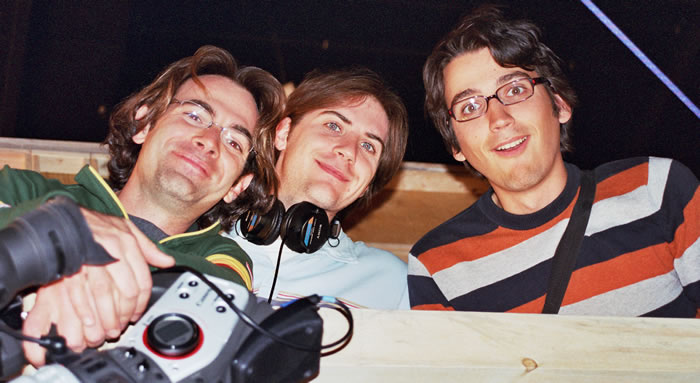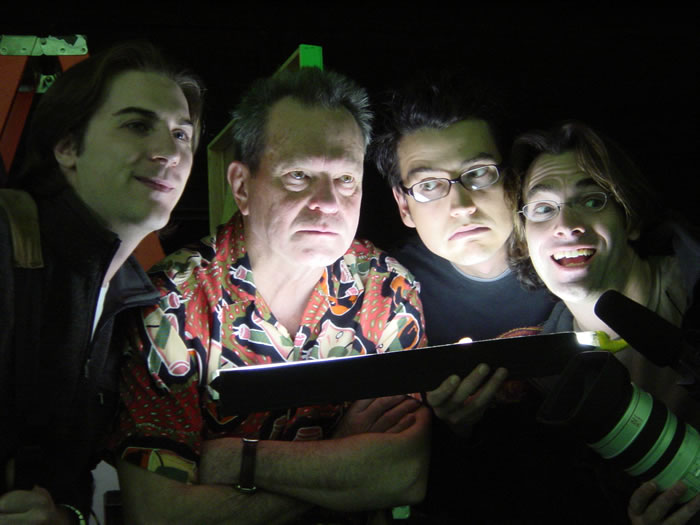An interview with the director of Cube and Cypher, who is creating a
documentary feature about the making of Tideland
by Phil Stubbs
The production of Terry Gilliam's Tideland has been followed by Canadian filmmaker Vincenzo Natali, whose own projects have included Cube, Cypher and most recently Nothing. Vincenzo talks about how he is tackling this documentary and also confirms what he will be doing next: an adaptation of a classic JG Ballard novel.
This interview took place in November 2004, in the canteen of Saskatchewan Studios in Regina, Canada.
For more on Tideland including interviews,
images and further information, follow the links on the
Dreams homepage
 |
|
Vincenzo Natali outside the Regina studios
(pic: Phil Stubbs) |
Vincenzo Natali: Well, it came out of the blue... I've never made a documentary before. I was working on a screenplay for a dramatic film that Jeremy Thomas and Gabriella Martinelli (the producers of Tideland) were working on with me. They called me and asked: Would you like to do a making of documentary for Tideland? My first thought was: I have no idea because I've never done this before. But I've always harboured a secret desire to make a movie about the making of a movie, because there are very few I think are actually accurate.
Having made a few films myself I haven't seen that many documentaries that really reflect the experience of a director on a set. And first I was going to say no just because there were so many projects of my own that I needed to attend to. But then I thought about it and considered the fact that Terry's one my all time favourite directors. In a sense this would just be not only be a great film to make but also an interesting experience for me - an amazing learning experience. I decided to say yes and that's why I'm here.
What kind of stuff are you capturing?
Well my goal with the documentary is less to document the making of this film than it is to document the process that Terry goes through making a movie. That's what I'm trying to hone in on: his approach to this film; why he makes certain creative decisions; emotionally how he deals with the day-to-day process of making this movie. So it's really more than anything a portrait of him. And to some extent the film itself is secondary.
What myths might you be debunking about Terry Gilliam?
Well I think the first myth that I desperately want to debunk is that he's a madman who is out of control. I get the impression that sometimes he encourages that himself because he's a very dramatic guy. He's a bit of a performer and I think he relishes the idea of being the mad artist - but the reality is he's very pragmatic. He's actually a very mathematical, logical thinker who knows exactly what it takes to make a movie and who is in love with the films that he makes and would never do anything that would endanger them. I think it's important for people to know that - especially film producers - because they shouldn't be afraid of Terry.
I think he's one of the most important filmmakers working. He's certainly one of the most interesting filmmakers of his generation. I would hate to see him have difficulty raising money for his films because people think he's out of control. So that's the first myth I want to debunk.
And I think I want this film to some extent to act as a counterbalance to Lost in La Mancha, because that was the film that recorded a disaster. I think the production of this film unquestionably is going to be a success. And it's an incredibly smooth easygoing, copasetic environment that Terry has nurtured himself. So it may not be as dramatically interesting but I think more intellectually interesting because this film is much more about how he works as opposed to what went wrong.
 |
|
Vincenzo Natali, Robin Crumley (Sound) and Brent
Brotten (Assistant and "all around
upstanding young man") on the set of Tideland (pic: Phil Stubbs) |
Documentary makers like to have a bit of conflict, you're not after that?
No, because there's none to be found. I try to push over a ladder, incite a fight now and then - but it just doesn't work! In fact, it's a really friendly set. And Terry's really happy making this film. I think he's having a good time and certainly everybody's having a great time working with him.
I think Lost in La Mancha is a good movie but what I personally missed from that film is just seeing Terry work. I am frankly much more interested in watching him as a director work with actors, and work with his crew than I was seeing a film fall apart. So that's what this one is going to be about - hopefully.
How much of the editing chores do you expect to be doing?
Well I have an editor I'm working with who cut my last film, an excellent editor and it's always a collaboration. I'm not doing it alone, I'll have a lot of help.
How many hours of footage will you expect to have by the end?
40% of everything I shoot I throw away instantly, so I think Michele my editor will be working with probably in the area of about 60 to 80 hours worth of footage. So for a documentary it's not outrageous, but it is very comprehensive because I have been on set since prep, since two weeks before production and I'll be here until the completion of the shooting.
And what distribution do you think your picture will get?
I think at best I think we'll have some theatrical distribution. We are definitely pulling a print of the movie so it's going to go to festivals. And I'm sure it will be available on DVD in some form. Whether that's with Tideland the movie or as its own separate disc I don't know. It'll be on television certainly here in Canada, possibly abroad. More than anything, this is a very self indulgent exercise. I'm totally doing it for me. To some extent I don't even care who gets to see it. I hope it gets out there but its really just like going back to film school. So it will definitely be on DVD. Whether its part of the Tideland release or whether it's its own release I don't know at this stage.
One thing I should point out - what makes this documentary so special is that Terry is so open that he's allowing me to get that close to him. He has a mic on him every day and he truly does not censor himself. He's very courageous that way.
My model for this film is actually a Henri-Georges Clouzot film called The Mystery of Picasso. It's an old documentary that the great French filmmaker made on Picasso. It was really a portrait of an artist and that's what I'm trying to do with this. I don't really see it as a "making of" documentary, I see it more as just an intimate portrait of a guy in the process of making a film.
I remember seeing a film of Picasso painting on a glass screen.
Yes, that's the one. And he also does it with light. I think there's a scene where he's got a light bulb and they shot it with a very slow shutter speed. He actually creates an image just by moving a light bulb.
 |
|
The documentary crew with Terry Gilliam, snapped
by Tideland producer Gabriella Martinelli
|
What equipment are you using?
We're using a brand new camera - a Canon XL2 Mini DV 24p camera. I think it's the best possible camera you could use for something like this because it gives you a very high quality image that's very warm, very filmic. But at the same time it is video and it's a very compact camera, so it doesn't get in the way. It doesn't call attention to itself when you are on the set.
The Canon people have actually sponsored us, they are kind of excited on the prospect of this being the first film that uses their camera because it's just come on the market. We got it the day they started production and it's the more upgraded model of the camera that was used on 28 Days Later.
Have you made a film since Cypher?
Yes I have a new film called Nothing - which is a title that causes endless confusion. It was just released in Canada a few months ago. If there is a single film that I've done that owes a real debt to Terry, that's it actually.
Has it hit Europe yet?
No, not yet. But we have a French distributor. I don't know if we have an English one or not yet.
Have you a project in mind after this Tideland documentary?
I have a few things I'm working on. But the project I'm working on with Jeremy and Gabriella is this thing called High Rise, which is an adaptation of the JG Ballard novel. I'm looking forward to that - it's a pretty outrageous book.
In June 2005, Vincenzo is currently editing the Tideland documentary in Toronto, and High Rise is still down as his next project.